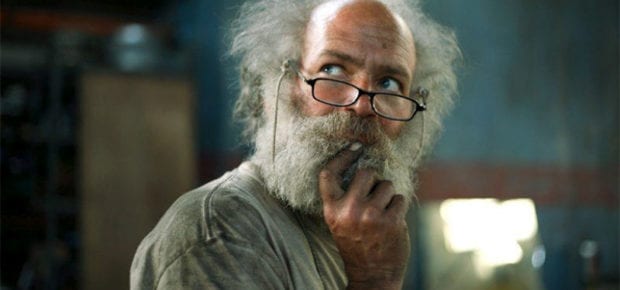July 28, 2015
John Cohn is an IBM Fellow in IBM Corporate Technical Strategy. His current focus is on physical infrastructure for Smarter Cities, open data, machine to machine communications and real time data analytics. Before joining Corporate Technology , John has been an innovator in the area of design automation for both analog and digital custom integrated circuits. In 2005 he was elected a Fellow of the IEEE in recognition of his contributions to the design automation for high performance custom circuits. He has more than 65 patents issued or pending in the field of design automation, methodology, and circuits .
John is active in education issues at a local, state and national level. John is so passionate about promoting science and engineering that he spent 58 days living and inventing in an abandoned steel mill as part of Discovery Channel’s technical survival show “The Colony”.
We sat down to talk with John about the process of becoming an engineer.
Q: What was the lowest grade you got in an undergrad engineering class and what did you learn from the experience?
A: I remember showing up at MIT in 1977 thinking I was so smart and in about a day and a half I was thinking “Oh my God, what have I gotten myself into?” And I think I might have actually made a C in Linear Systems, which is a core class that every MIT nerd — and I AM a nerd — had to take and I really struggled through it because it was full of discreet math and I just didn’t know it. The irony of that is that I ended up going into a field where I use that every day. It was very humbling. At the same time I got great help and I finally got that stuff bored into my head — or at least I think I did.
It really taught me that you can always learn more and you are not as smart as you think you are. And it is a useful thing to learn what your limitations are. It also gave me hope that no matter how hard something is, I can eventually learn it if I kept going back to it.
If you haven’t picked up the wrong end of a soldering iron at least once, you haven’t lived.
Q: Why did you become an engineer?
A: When I think about why I wanted to become an engineer, I don’t even remember a time when I didn’t want to be an engineer. My Mom has a little picture that I drew back in elementary school and it said I wanted to be an engineer and I wanted to go to MIT. I still think it was forced because I don’t know how I would have known what MIT was when I was 8.
I grew up in Houston — well, to the extent that I ‘grew up’ – in the 1960s when the space race was everywhere, and NASA was everywhere, and I went to school with some of the astronaut’s kids, and the whole United States, the whole world really, was space crazy. So the idea of building really cool stuff and making things work was just kind of in my blood.
My parents were really supportive. Neither of them were technical, but I had a little build space in the garage and I started collecting electronics and explosives and various other things and I can never remember a time when I wasn’t a tinkerer.
Q: Your parents gave you explosives?!
A: It was funny, when my parents decided to move from Houston up to Boston I wanted to go down and look through stuff, and I’m so glad I did. When I went looking through my little garage lab there were some of these little containers still there, with the labels coming off well… let’s just say it would have been in the newspaper if someone had just dumped them in the garbage.
I don’t want to get them in trouble, but I’ll say that my parents were very supportive. I remember I had this big container of red fuming nitric acid and I had this can of something called sodium peroxide — which is just incredibly dangerous. Do you remember an airline called Value Jet? It doesn’t exist anymore. It got renamed because of sodium peroxide. So let’s just leave it at that.
Q: So the key to raising an engineer is to give your kids explosives?
A: I think one of the keys to being a good engineer — or maybe a parent of an engineer, or scientist, or a maker (because I don’t think some ‘makers’ would call themselves engineers) is the ability to go and learn by hand and make some mistakes.
I am a big believer in safety. I go to Burning Man. We say “safety third.” You want to be careful. I mean you only have two eyes and ten fingers. But sometimes we get so risk averse that we don’t let kids actually try stuff. We are so concerned that they might make a mistake, or that they might hurt themselves that they don’t really get to learn. So I am kind of on the edge that would say ‘supervise, but allow.’ And that is what my parents were really good at.
I think the pendulum is swinging back a little bit with the whole Do-It-Yourself/Maker movement. I am not suggesting that people play with dangerous things, but if you haven’t picked up the wrong end of a soldering iron at least once, you haven’t lived.
Q: What is the best advice you’d give to someone who is interested in becoming an engineer?
A: The best advice I have is to actually try things yourself. Oftentimes we think about engineering, or math or science, and you take a test, and you get the answer in the back of the book. But no one who is actually practicing in engineering is trying to find the answer to a known problem. Its about doing new things. So I think the best advice I can give to someone new is to actually go in and work with your hands. Try stuff. It might be making circuits or it might be writing software. The whole idea of making things involves trying things out, making mistakes, making better mistakes, and then eventually succeeding. You figure out what your limitations are, you figure out what you need to get better at. You really build your skills. You build intuition about materials and components. So my best advice would be: don’t talk about it, just do it. Try building something.
There is no better time to be doing that then right now. The whole maker/do-it-yourself movement is great. And the Internet is such a great resource for information whether it is electronic components, or hardware, or software, or jewelry making, or bio-hacking. There is such a wealth of assets out there, including people who can help you.
There is also a wealth of questionable information out there, so you have to use some judgment about what experiments to try to follow. But the ideal is that you can actually try something and then put it back out there for other people to build on. So that whole virtuous cycle of I want to do something, then you can help me, then I can put my stuff out there and people can build on top of it is addictive. I can’t imagine a better time than right now to be a nerd.





 Meaningful Momentum or Running in Place?
Meaningful Momentum or Running in Place? AI Through Our Ages
AI Through Our Ages Liquid Infrastructure: Our Planet's Most Precious Resource
Liquid Infrastructure: Our Planet's Most Precious Resource The Impact of Technology in 2025
The Impact of Technology in 2025 Quantum and AI: Safeguards or Threats to Cybersecurity?
Quantum and AI: Safeguards or Threats to Cybersecurity? Why AI Can't Live Without Us
Why AI Can't Live Without Us Bits, Bytes, Buildings and Bridges: Digital-Driven Infrastructure
Bits, Bytes, Buildings and Bridges: Digital-Driven Infrastructure Impact of Technology in 2024
Impact of Technology in 2024 Emerging AI Cybersecurity Challenges and Solutions
Emerging AI Cybersecurity Challenges and Solutions The Skies are Unlimited
The Skies are Unlimited Smart Cities 2030: How Tech is Reshaping Urbanscapes
Smart Cities 2030: How Tech is Reshaping Urbanscapes Impact of Technology 2023
Impact of Technology 2023 Cybersecurity for Life-Changing Innovations
Cybersecurity for Life-Changing Innovations Smarter Wearables Healthier Life
Smarter Wearables Healthier Life Infrastructure In Motion
Infrastructure In Motion The Impact of Tech in 2022 and Beyond
The Impact of Tech in 2022 and Beyond Cybersecurity, Technology and Protecting Our World
Cybersecurity, Technology and Protecting Our World How Technology Helps us Understand Our Health and Wellness
How Technology Helps us Understand Our Health and Wellness The Resilience of Humanity
The Resilience of Humanity Harnessing and Sustaining our Natural Resources
Harnessing and Sustaining our Natural Resources Creating Healthy Spaces Through Technology
Creating Healthy Spaces Through Technology Exceptional Infrastructure Challenges, Technology and Humanity
Exceptional Infrastructure Challenges, Technology and Humanity The Global Impact of IEEE's 802 Standards
The Global Impact of IEEE's 802 Standards Scenes of our Cyber Lives: The Security Threats and Technology Solutions Protecting Us
Scenes of our Cyber Lives: The Security Threats and Technology Solutions Protecting Us How Millennial Parents are Embracing Health and Wellness Technologies for Their Generation Alpha Kids
How Millennial Parents are Embracing Health and Wellness Technologies for Their Generation Alpha Kids Space Exploration, Technology and Our Lives
Space Exploration, Technology and Our Lives Global Innovation and the Environment
Global Innovation and the Environment How Technology, Privacy and Security are Changing Each Other (And Us)
How Technology, Privacy and Security are Changing Each Other (And Us) Find us in booth 31506, LVCC South Hall 3 and experience the Technology Moon Walk
Find us in booth 31506, LVCC South Hall 3 and experience the Technology Moon Walk Virtual and Mixed Reality
Virtual and Mixed Reality How Robots are Improving our Health
How Robots are Improving our Health IEEE Experts and the Robots They are Teaching
IEEE Experts and the Robots They are Teaching See how millennial parents around the world see AI impacting the lives of their tech-infused offspring
See how millennial parents around the world see AI impacting the lives of their tech-infused offspring Take the journey from farm to table and learn how IoT will help us reach the rising demand for food production
Take the journey from farm to table and learn how IoT will help us reach the rising demand for food production Watch technical experts discuss the latest cyber threats
Watch technical experts discuss the latest cyber threats Explore how researchers, teachers, explorers, healthcare and medical professionals use immersive technologies
Explore how researchers, teachers, explorers, healthcare and medical professionals use immersive technologies Follow the timeline to see how Generation AI will be impacted by technology
Follow the timeline to see how Generation AI will be impacted by technology Learn how your IoT data can be used by experiencing a day in a connected life
Learn how your IoT data can be used by experiencing a day in a connected life Listen to technical experts discuss the biggest security threats today
Listen to technical experts discuss the biggest security threats today See how tech has influenced and evolved with the Games
See how tech has influenced and evolved with the Games Enter our virtual home to explore the IoT (Internet of Things) technologies
Enter our virtual home to explore the IoT (Internet of Things) technologies Explore an interactive map showcasing exciting innovations in robotics
Explore an interactive map showcasing exciting innovations in robotics Interactively explore A.I. in recent Hollywood movies
Interactively explore A.I. in recent Hollywood movies Get immersed in technologies that will improve patients' lives
Get immersed in technologies that will improve patients' lives